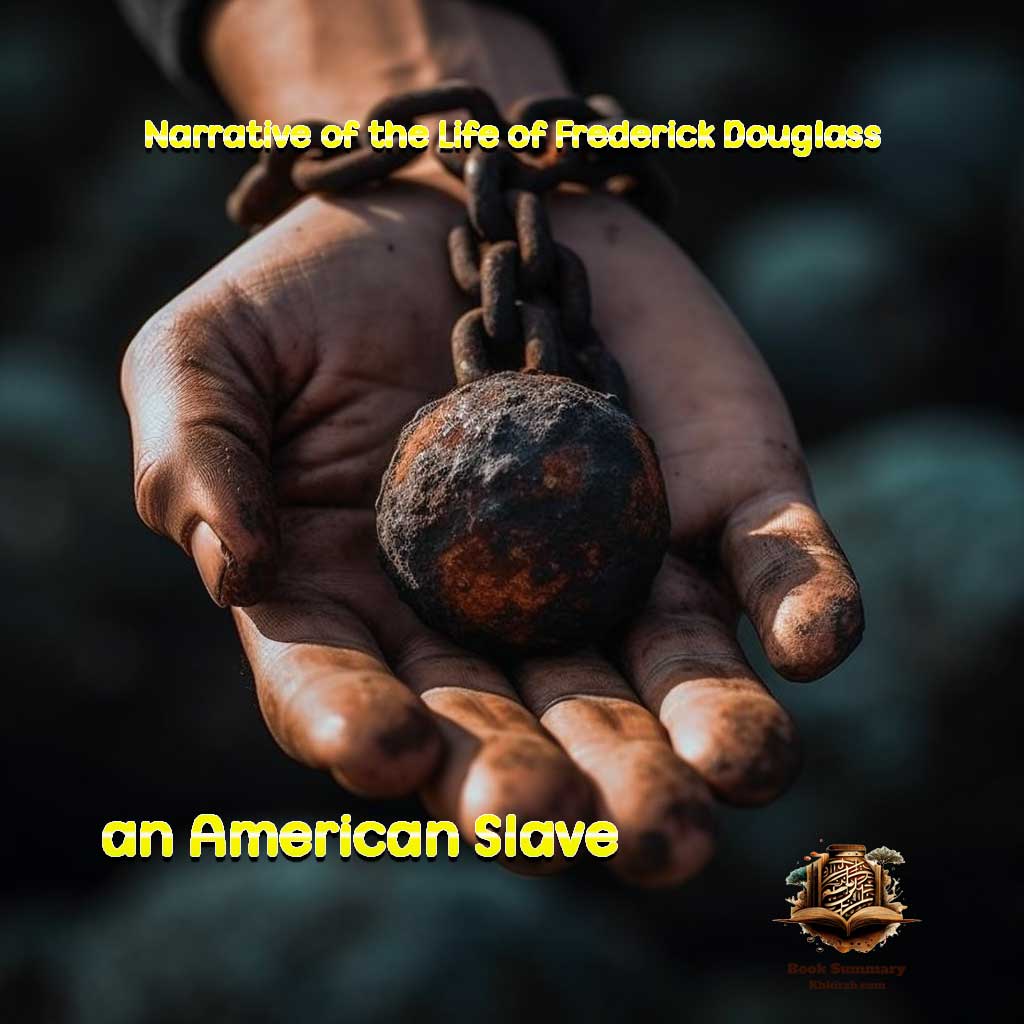Narrative of the Life of Frederick Douglass, an American Slave Book Summary

Among the pages of human history, astonishing and moving stories emerge about struggle and perseverance in the face of harsh circumstances. The story of the “Narrative of the Life of Frederick Douglass, an American Slave,” is one such unique tale. In this book, Frederick Douglass, one of the most prominent activists of the nineteenth century, narrates his personal experience with slavery, education, and the fight for freedom. The book presents us with a glimpse of humanity under the harshest conditions and how willpower and courage can alter the course of life.
Table of Contents
From Chains to Freedom: A Glimpse into Frederick Douglass’s Journey in ‘Narrative of the Life of Frederick Douglass, An American Slave’
Frederick Douglass’s memoir ‘Narrative of the Life of Frederick Douglass, An American Slave’ provides a heart-wrenching, detailed account of his life that begins in the depths of slavery. The account commences with Douglass’s earliest years, and the appalling conditions he endured as a child and youth enslaved in the American South.
From the onset, Douglass paints a horrifying picture of the reality of slavery. Born into a world of unimaginable cruelty, Douglass’s childhood was marred by the brutality and dehumanization inherent in the institution of slavery. He recounts heartrending scenes of violence and dejection, of mothers and their children ripped apart, of humanity stripped to bare survival.
Douglass’s depiction of his early life is nothing short of brutal. He is brutally honest about the conditions of the slave cabins, the inadequate food and clothing, and the intense labor that even young children were forced to undertake. He details the hopelessness that permeated the plantations, with slaves living under the constant threat of physical punishment, the whip, or worse.
As Douglass was shuffled from plantation to plantation, he was exposed to masters and overseers both kind and cruel. However, it was the cruel ones that left the deepest scars. Douglass vividly describes his experiences with these individuals, their harsh treatment, and the relentless dehumanization that they embodied.
However, the memoir is not only a tale of despair. It also illuminates moments of resistance and courage. Young Douglass displayed a curiosity and intelligence that made him yearn for something beyond the brutal confines of his existence. His early encounters with literacy, particularly his efforts to teach himself to read and write, were turning points that would fuel his desire for freedom.
The childhood and youth of Frederick Douglass were a crucible of pain and endurance, but they were also the foundation of his indomitable spirit. The brutal conditions he faced didn’t break him; instead, they forged him into a man of immense courage, resilience, and determination. It was in the fields and cabins of the American South that a slave boy named Frederick Douglass started his journey to become one of the most iconic figures of American history. His beginnings, as gut-wrenching as they were, were the making of the man who would play an instrumental role in the abolitionist movement, forever shaping the course of American history.
Our Facebook Page – Book Summary
The Power of the Written Word: Self-Education and Awakening in Frederick Douglass’s ‘Narrative of the Life of Frederick Douglass, An American Slave’
In ‘Narrative of the Life of Frederick Douglass, An American Slave’, Douglass unfolds an inspiring tale of self-education amidst the harsh confines of slavery. The enslaved child’s introduction to literacy was a watershed moment, igniting an indomitable spirit within him and catalyzing his journey from bondage to emancipation.
Douglass was born into a world where slaves were deliberately kept ignorant, a tool of control by the slaveholders who believed that an educated slave was a dangerous one. The young Douglass, however, was not to be so easily contained. His early interactions with the alphabet were incidental, a covert glimpse into a forbidden world facilitated by the mistress of the household, who initially began teaching him to read but was quickly dissuaded by her husband’s stern objections.
Undeterred by this setback, Douglass embarked on a clandestine mission of self-education. He mastered the art of reading by bargaining bits of bread for lessons with poor white children in the neighborhood. He scrounged newspapers and books discarded in the streets and taught himself to write by tracing the letters in a children’s book. This act of defiance – learning to read and write – was a radical one. It was not just about literacy; it was about claiming a piece of humanity that had been denied to him.
Reading and writing opened up a new world for Douglass. Through newspapers, he learned about the abolitionist movement, which introduced him to the idea that slavery was not an immutable fact of life but a moral evil that could and should be abolished. Books became his solace and his guides, particularly the ‘Columbia Orator,’ which gave him the tools to critique the institution of slavery and the intellectual firepower to dream of a world free of chains.
Self-education transformed Douglass. It sparked his intellectual awakening, fueling his desire for freedom and fostering a deep-seated determination to resist the oppressive system of slavery. His growing consciousness led him to challenge the injustices inflicted upon him and his fellow slaves, bringing him into direct conflict with his masters.
Douglass’s pursuit of knowledge was a testament to his extraordinary tenacity and resilience. Despite the many obstacles he faced, he taught himself to read and write, awakening a consciousness that would propel his journey from a life of servitude to a beacon of the abolitionist movement. His story is a powerful testament to the transformative power of education and the enduring human spirit’s resilience in the face of adversity.
History – Book Summary (khkitab.com)
The Unyielding Pursuit of Liberty: Frederick Douglass’s Journey to Freedom in ‘Narrative of the Life of Frederick Douglass, An American Slave’
In ‘Narrative of the Life of Frederick Douglass, An American Slave’, the insatiable longing for freedom forms the throbbing pulse of the narrative. The memoir, a potent critique of the institution of slavery, records Douglass’s audacious quest for freedom that challenged the pervasive, oppressive system.
Douglass’s pursuit of freedom was an evolving process, deeply intertwined with his growing consciousness and self-education. His ability to read and write exposed him to the ideas of freedom and human rights, concepts alien in the dehumanizing realm of slavery. These insights fanned the spark of rebellion that had always simmered within him, fueling his resolve to break free from his chains.
Yet, the path to freedom was fraught with risks. Early in the narrative, Douglass recounts instances where fellow slaves attempted to escape, only to be met with brutal punishment or even death. These harrowing experiences served as grim reminders of the potential consequences of his yearning for liberty. Nonetheless, Douglass remained undeterred. His spirit, once ignited by the idea of freedom, could not be quelled.
Carefully, Douglass began to plot his escape. He was aware that an unsuccessful attempt could lead to severe consequences, but the lure of freedom was irresistible. He meticulously planned every aspect, keeping his plans secret even from his fellow slaves to avoid detection. Despite his initial plan’s failure, he didn’t let despair overwhelm him. His determination, fortified by his passionate belief in the fundamental right to freedom, remained unbroken.
The narrative then reaches its dramatic climax when Douglass finally achieves his dream of freedom. However, in a remarkable display of prudence, he refrains from divulging the exact details of his escape to protect those still enslaved. What we know, however, is the profound sense of relief and triumph that Douglass conveys upon reaching the free states.
The story of Frederick Douglass’s escape from slavery is a testament to his extraordinary courage, resilience, and intelligence. It stands as a powerful beacon of hope, a symbol of the indomitable human spirit that refuses to be shackled by chains. Douglass’s memoir not only tells the tale of his personal struggle for freedom but also serves as an indictment of the horrors of slavery and an enduring call for justice and human rights.
From Chains to Change: Frederick Douglass’s Crusade for Equality in ‘Narrative of the Life of Frederick Douglass, An American Slave’
In ‘Narrative of the Life of Frederick Douglass, An American Slave’, Douglass’s narrative doesn’t halt at his escape from slavery; rather, it pivots towards his new life as a free man and civil rights activist. His experience of life after slavery is a testament to his unwavering commitment to justice and equality, illuminating his transformation from an enslaved person into an influential advocate for abolition and civil rights.
Obtaining freedom was merely the first step for Douglass; his pursuit of equality was a lifelong journey. As a freedman in the North, he faced a different, yet equally challenging, set of obstacles. Systemic racism and discrimination were pervasive, revealing that liberty was more than just the absence of physical chains. Douglass’s fierce intelligence and indomitable spirit, however, remained his steadfast allies as he navigated his new reality.
Douglass’s personal experiences with slavery and racism endowed him with a unique perspective, which he utilized to illuminate the injustices entrenched within American society. His ability to articulate his experiences powerfully and poignantly soon caught the attention of abolitionist leaders, drawing him into the socio-political arena.
As a speaker for the American Anti-Slavery Society, Douglass began to wield his personal narrative as a potent weapon against the institution of slavery. He stood before crowds, candidly sharing his experiences and providing a first-hand account of the brutality and inhumanity of slavery. His eloquent speeches touched hearts and minds, challenging the complacency and indifference of those who turned a blind eye to the abhorrent practice.
Furthermore, Douglass became a prolific writer, utilizing the power of the written word to reach a wider audience. His memoir, which we delve into now, not only recounted his personal journey from slavery to freedom but also exposed the abominable reality of slavery, which many in the North were ignorant about or chose to ignore.
His life after slavery was marked by ceaseless activism. Douglass fervently championed for the abolition of slavery and advocated for civil rights, tirelessly working to eradicate racial disparities in education, voting rights, and employment. His writings and speeches became instrumental in shaping the national discourse on these critical issues, forever cementing his legacy as a stalwart champion of equality.
Frederick Douglass’s life after slavery is a story of profound courage, resilience, and determination. It serves as an enduring testament to his extraordinary commitment to equality and justice, reflecting the transformative power of one man’s relentless pursuit of freedom, not only for himself but for all.
Breaking the Chains: Frederick Douglass and the Fight for Civil Rights in ‘Narrative of the Life of Frederick Douglass, An American Slave’
In ‘Narrative of the Life of Frederick Douglass, An American Slave’, Douglass unveils his pivotal role in the fight for the rights of African Americans and his profound influence in shaping the abolitionist movement. This section of his narrative sheds light on his journey from a formerly enslaved individual to a prominent advocate for civil rights.
As Douglass embarked on his quest for freedom, he quickly realized that the struggle for liberty extended far beyond his personal emancipation. His experiences of oppression and injustice fueled a burning desire to challenge the systemic racism and discrimination that permeated American society. Recognizing that his story was not an isolated incident but rather a reflection of the plight of millions, he dedicated himself to the fight for civil rights.
Douglass emerged as a powerful voice against slavery, drawing from his personal experiences to expose the inhumanity and moral bankruptcy of the institution. His eloquence, combined with his unwavering conviction, captivated audiences and rallied support for the abolitionist cause. Through his speeches, he sought to dismantle the deeply entrenched myths and justifications used to perpetuate the brutal system of slavery.
Moreover, Douglass’s involvement in the abolitionist movement extended beyond the podium. He actively participated in the Underground Railroad, a network of individuals and safe houses that assisted enslaved people in their escape to freedom. Douglass risked his own safety by harboring and aiding those seeking liberation, exemplifying his unwavering commitment to the cause.
As his influence grew, Douglass played a crucial role in shaping the abolitionist movement. He worked alongside prominent figures such as William Lloyd Garrison and Sojourner Truth, contributing to the intellectual and strategic development of the movement. His advocacy extended beyond the abolition of slavery, as he became an advocate for the rights of women and championed other social justice causes, recognizing the interconnectedness of various forms of oppression.
Douglass’s words and actions challenged the deeply ingrained prejudices of the time, forcing society to confront its own moral failings. He traveled extensively, delivering impassioned speeches that called for racial equality, suffrage, and an end to discrimination. His impact on the abolitionist movement and the broader struggle for civil rights cannot be overstated.
Frederick Douglass’s unwavering commitment to justice and equality forever solidifies his place in history. His contributions to the fight against slavery and his tireless efforts to advance civil rights have left an indelible mark. His narrative serves as a testament to the power of one person’s determination to effect change, inspiring future generations to continue the ongoing struggle for justice and equality.
Frederick Douglass: A Beacon of Resilience and Liberation
In ‘Narrative of the Life of Frederick Douglass, An American Slave’, Frederick Douglass’s narrative doesn’t conclude with his personal triumph over slavery; instead, it transcends time and space, leaving an indelible legacy that continues to inspire the ongoing struggle for freedom and equality. Douglass’s story, both in his memoir and his subsequent writings, has shaped the trajectory of social justice movements and solidified his status as a symbol of resilience and liberation.
Douglass’s words carried immense power during his time, and they continue to resonate today. Through his narrative, he illuminated the horrific realities of slavery, shedding light on the dehumanization, cruelty, and brutality experienced by enslaved individuals. His firsthand account of the atrocities inflicted upon him and his fellow slaves was a catalyst for change, evoking empathy and outrage among readers and listeners.
However, Douglass’s influence extended beyond the abolitionist movement of the 19th century. His writings and speeches have left an indelible mark on the struggle for civil rights and social justice movements that followed. His profound insights into the interconnectedness of various forms of oppression, such as racism, sexism, and classism, continue to guide activists today.
Douglass’s legacy is not only rooted in his writings but also in his actions. His unwavering commitment to justice and equality was not confined to his own liberation but extended to advocating for the rights of all marginalized communities. He recognized that the fight for liberation and equality was not isolated to one group; it encompassed the liberation of humanity as a whole.
As a tireless advocate, Douglass’s contributions reverberate through history. His powerful speeches and articulate writings challenged the status quo and compelled society to confront its deep-seated prejudices. He was not only a voice for the enslaved but also a champion for women’s rights, education, and the eradication of discrimination in all its forms.
Frederick Douglass’s legacy is marked by his enduring impact on the collective consciousness of humanity. His words, resolute and unwavering, continue to inspire individuals to rise against oppression and fight for justice. He stands as a symbol of resilience, demonstrating that even in the face of unimaginable adversity, one can triumph and effect change.
Today, Frederick Douglass remains an emblem of courage, resilience, and liberation. His story and writings continue to be studied, celebrated, and shared as a reminder of the enduring power of the human spirit. As we reflect on his legacy, we are called to embrace the values of freedom, equality, and justice, and to carry forward the torch he lit, ensuring that his vision of a more equitable society becomes a reality.



I like this website and its containers , I need read more history of British and American civilization. Thanks